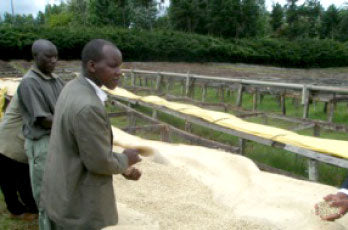13 products
Coffee was introduced to Kenyal in 1893 by a Scotish preacher and has become Kenya’s leading export item. Coffee was brought to Nyeri and Kirinyaga in 1920 and now these areas are famous for good quality beans.

The coffee beans are from Nyeri and Kirinyaga in Kenya.
Masai grows in a climate where the average temperature is from 10 to 26℃ with abundant rainfall.
Enjoy Kenyan coffee that is a gift from the land!


【Name】Coffee
【Raw material name】Coffee beans
【expiration date】3 months from the roasting date
【Preservation method】Avoid direct sunlight, high temperature and high humidity
【Manufacturer/Processing/Distributor Name and Address】TAKAMURA WINE & COFFEE ROASTERS
2-2-18 edobori nishiku Osaka
The aroma and flavor have attracted quite a bit of attention worldwide.
It was 2004 when Geisha, believed to have originated in Ethiopia, first entered the spotlight in the world. It began when La Esmeralda entered the Best of Panama coffee competition with the highest price at that time.
La Esmeralda has kept beating their own record and has become a legendary coffee.

La Esmeralda is located in the South-West mountains of Panama. The average elevation is 1,600m, surrounded with rich nature such as rain and a native forest. They use no agricultural chemicals and select only ripe cherries. They are also careful with processing after harvesting - it is the farm where they produce the world’s top coffee beans.
Private Collection is a micro lot with a unique aroma from this farm, planted between 1600 and 1800m.



【Name】Coffee
【Raw material name】Coffee beans
【expiration date】3 months from the roasting date
【Preservation method】Avoid direct sunlight, high temperature and high humidity
【Manufacturer/Processing/Distributor Name and Address】TAKAMURA WINE & COFFEE ROASTERS
2-2-18 edobori nishiku Osaka













![● Colombia ALE Processe Campo Hermoso[C]](http://en.takamura-coffee.com/cdn/shop/files/4993199692353c1_7ba3328e-a1f5-4c14-8278-6023ec41fc87_{width}x.jpg?v=1760946352)
![● Colombia ALE Processe Campo Hermoso[C]](http://en.takamura-coffee.com/cdn/shop/files/4993199692353c2_7f200aeb-1e32-4033-815b-7d61034f5d44_{width}x.jpg?v=1760946352)
![● Colombia ALE Processe Campo Hermoso[C]](http://en.takamura-coffee.com/cdn/shop/files/col-ale_e62ce561-b38f-4c29-92ba-08d02bf01d7e_{width}x.jpg?v=1760946352)
![● Colombia ALE Processe Campo Hermoso[C]](http://en.takamura-coffee.com/cdn/shop/files/4993199692346_644b1a73-32f5-46d2-9f07-ea043e3bb3fb_{width}x.jpg?v=1760946352)
![● Colombia ALE Processe Campo Hermoso[C]](http://en.takamura-coffee.com/cdn/shop/files/tcr_special03_{width}x.jpg?v=1760946352)
![● Colombia ALE Processe Campo Hermoso[C]](http://en.takamura-coffee.com/cdn/shop/files/4993199692353-2_1d8c2b57-32a9-4374-b4c9-a33a6e14b94a_{width}x.jpg?v=1756884395)
![● Costa Rica GeishaDon Mayo La Loma( CUP OF EXCELLENCE 2024 COE#15)[C]](http://en.takamura-coffee.com/cdn/shop/files/4993199701635c1_{width}x.jpg?v=1760946296)
![● Costa Rica GeishaDon Mayo La Loma( CUP OF EXCELLENCE 2024 COE#15)[C]](http://en.takamura-coffee.com/cdn/shop/files/4993199701635c2_{width}x.jpg?v=1760946296)
![● Costa Rica GeishaDon Mayo La Loma( CUP OF EXCELLENCE 2024 COE#15)[C]](http://en.takamura-coffee.com/cdn/shop/files/cri-15don_366c1640-5f4b-4c25-9072-aebacc36a790_{width}x.jpg?v=1760946296)
![● Costa Rica GeishaDon Mayo La Loma( CUP OF EXCELLENCE 2024 COE#15)[C]](http://en.takamura-coffee.com/cdn/shop/files/4993199701628_{width}x.jpg?v=1760946296)
![● Costa Rica GeishaDon Mayo La Loma( CUP OF EXCELLENCE 2024 COE#15)[C]](http://en.takamura-coffee.com/cdn/shop/files/tcr_coe03_c254f6d2-7ae4-482e-b6f2-0379c7b31138_{width}x.jpg?v=1760946296)
![● Costa Rica GeishaDon Mayo La Loma( CUP OF EXCELLENCE 2024 COE#15)[C]](http://en.takamura-coffee.com/cdn/shop/files/4993199701635-2_{width}x.jpg?v=1756882750)
![● Costa Rica GeishaDon Mayo La Loma( CUP OF EXCELLENCE 2024 COE#15)[C]](http://en.takamura-coffee.com/cdn/shop/files/4993199701635-3_{width}x.jpg?v=1756882750)
![●BRAZIL Fruta Mercadao [C]](http://en.takamura-coffee.com/cdn/shop/products/4993199680329c1_{width}x.jpg?v=1760946797)
![●BRAZIL Fruta Mercadao [C]](http://en.takamura-coffee.com/cdn/shop/products/4993199680329c2_{width}x.jpg?v=1760946797)
![●BRAZIL Fruta Mercadao [C]](http://en.takamura-coffee.com/cdn/shop/files/bra-fruta_{width}x.jpg?v=1760946797)
![●BRAZIL Fruta Mercadao [C]](http://en.takamura-coffee.com/cdn/shop/products/4993199680312_{width}x.jpg?v=1760946797)
![●BRAZIL Fruta Mercadao [C]](http://en.takamura-coffee.com/cdn/shop/files/tcr_standard03_f61b321a-af02-49d1-ac2d-4b1655a81d47_{width}x.jpg?v=1760946797)
![●BRAZIL Fruta Mercadao [C]](http://en.takamura-coffee.com/cdn/shop/products/4993199680329-2_{width}x.jpg?v=1756798821)
![●ETHIOPIA Yirgaheffe G1 [C]](http://en.takamura-coffee.com/cdn/shop/products/4993199678227c1_{width}x.jpg?v=1760946399)
![●ETHIOPIA Yirgaheffe G1 [C]](http://en.takamura-coffee.com/cdn/shop/products/4993199678227c2_{width}x.jpg?v=1760946399)
![●ETHIOPIA Yirgaheffe G1 [C]](http://en.takamura-coffee.com/cdn/shop/files/eth-g1_{width}x.jpg?v=1760946399)
![●ETHIOPIA Yirgaheffe G1 [C]](http://en.takamura-coffee.com/cdn/shop/products/4993199678210_{width}x.jpg?v=1760946399)
![●ETHIOPIA Yirgaheffe G1 [C]](http://en.takamura-coffee.com/cdn/shop/files/tcr_standard03_{width}x.jpg?v=1760946399)
![●ETHIOPIA Yirgaheffe G1 [C]](http://en.takamura-coffee.com/cdn/shop/products/4993199678227-2_{width}x.jpg?v=1756797374)
![●Indonesia Gold Top Mandheling [C]](http://en.takamura-coffee.com/cdn/shop/products/4993199678265c1_{width}x.jpg?v=1760946459)
![●Indonesia Gold Top Mandheling [C]](http://en.takamura-coffee.com/cdn/shop/products/4993199678265c2_{width}x.jpg?v=1760946459)
![●Indonesia Gold Top Mandheling [C]](http://en.takamura-coffee.com/cdn/shop/files/idn-mand_{width}x.jpg?v=1760946459)
![●Indonesia Gold Top Mandheling [C]](http://en.takamura-coffee.com/cdn/shop/products/4993199678258_{width}x.jpg?v=1760946459)
![●Indonesia Gold Top Mandheling [C]](http://en.takamura-coffee.com/cdn/shop/files/tcr_standard03_f8460650-1703-42b5-bc71-143763950a6b_{width}x.jpg?v=1760946459)
![●Indonesia Gold Top Mandheling [C]](http://en.takamura-coffee.com/cdn/shop/products/4993199678265-04_{width}x.jpg?v=1756798269)
![●Kenya Masai Dark Roast [C]](http://en.takamura-coffee.com/cdn/shop/products/4993199678463c1_{width}x.jpg?v=1760946437)
![●Kenya Masai Dark Roast [C]](http://en.takamura-coffee.com/cdn/shop/products/4993199678463c2_{width}x.jpg?v=1760946437)
![●Kenya Masai Dark Roast [C]](http://en.takamura-coffee.com/cdn/shop/files/ken-masaid_{width}x.jpg?v=1760946437)
![●Kenya Masai Dark Roast [C]](http://en.takamura-coffee.com/cdn/shop/products/4993199678456_{width}x.jpg?v=1760946437)
![●Kenya Masai Dark Roast [C]](http://en.takamura-coffee.com/cdn/shop/files/tcr_standard03_229af3a3-0716-4d63-964b-d9cb6b29beb0_{width}x.jpg?v=1760946437)
![●Kenya Masai Dark Roast [C]](http://en.takamura-coffee.com/cdn/shop/products/4993199678463-2_{width}x.jpg?v=1756797948)
![●Kenya Masai Light Roast [C]](http://en.takamura-coffee.com/cdn/shop/products/4993199678425c1_{width}x.jpg?v=1760946418)
![●Kenya Masai Light Roast [C]](http://en.takamura-coffee.com/cdn/shop/products/4993199678425c2_{width}x.jpg?v=1760946418)
![●Kenya Masai Light Roast [C]](http://en.takamura-coffee.com/cdn/shop/files/ken-masail_{width}x.jpg?v=1760946418)
![●Kenya Masai Light Roast [C]](http://en.takamura-coffee.com/cdn/shop/products/4993199678418_{width}x.jpg?v=1760946418)
![●Kenya Masai Light Roast [C]](http://en.takamura-coffee.com/cdn/shop/files/tcr_standard03_45948375-ad0e-4a93-b37a-e496acb1fe07_{width}x.jpg?v=1760946418)
![●Kenya Masai Light Roast [C]](http://en.takamura-coffee.com/cdn/shop/products/4993199678425-2_{width}x.jpg?v=1756797659)
![●Mexico Decaf [C]](http://en.takamura-coffee.com/cdn/shop/products/4993199678302c1_{width}x.jpg?v=1760946480)
![●Mexico Decaf [C]](http://en.takamura-coffee.com/cdn/shop/products/4993199678302c2_{width}x.jpg?v=1760946480)
![●Mexico Decaf [C]](http://en.takamura-coffee.com/cdn/shop/files/mex-decaf_{width}x.jpg?v=1760946480)
![●Mexico Decaf [C]](http://en.takamura-coffee.com/cdn/shop/products/4993199678296_{width}x.jpg?v=1760946480)
![●Mexico Decaf [C]](http://en.takamura-coffee.com/cdn/shop/files/tcr_standard03_eed03abb-cd51-4eee-a081-f16b712a1d2b_{width}x.jpg?v=1760946480)
![●Mexico Decaf [C]](http://en.takamura-coffee.com/cdn/shop/products/4993199678302-2_{width}x.jpg?v=1756798549)
![●PANAMA LA ESMERALDA PRIVATE COLLECTION “GEISHA” [C]](http://en.takamura-coffee.com/cdn/shop/products/4993199678661c1_{width}x.jpg?v=1760946376)
![●PANAMA LA ESMERALDA PRIVATE COLLECTION “GEISHA” [C]](http://en.takamura-coffee.com/cdn/shop/products/4993199678661c2_{width}x.jpg?v=1760946376)
![●PANAMA LA ESMERALDA PRIVATE COLLECTION “GEISHA” [C]](http://en.takamura-coffee.com/cdn/shop/files/pan-geisha_04057d66-8bec-4ff7-926c-fd03d308177a_{width}x.jpg?v=1760946376)
![●PANAMA LA ESMERALDA PRIVATE COLLECTION “GEISHA” [C]](http://en.takamura-coffee.com/cdn/shop/products/4993199678654_{width}x.jpg?v=1760946376)
![●PANAMA LA ESMERALDA PRIVATE COLLECTION “GEISHA” [C]](http://en.takamura-coffee.com/cdn/shop/files/tcr_geisha03_{width}x.jpg?v=1760946376)
![●PANAMA LA ESMERALDA PRIVATE COLLECTION “GEISHA” [C]](http://en.takamura-coffee.com/cdn/shop/products/4993199678661-3_{width}x.jpg?v=1756884352)
![●PANAMA LA ESMERALDA PRIVATE COLLECTION “GEISHA” [C]](http://en.takamura-coffee.com/cdn/shop/products/4993199678661-2_{width}x.jpg?v=1756884352)